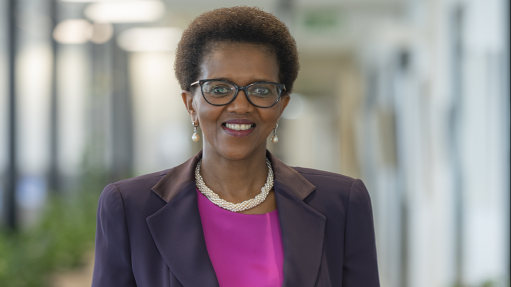
Minerals Council South Africa president Nolitha Fakude.
JOHANNESBURG (miningweekly.com) – The biggest opportunity mining has as an industry is to help the world to transition to a net-zero carbon world, Minerals Council South Africa president Nolitha Fakude said on Wednesday.
Fakude, who is also chairperson of Anglo American's management board in South Africa, highlighted this during her keynote address at the Joburg Indaba, covered by Mining Weekly.
“With climate change and the global energy transition well underway, it is many of the metals and minerals which we produce right here in South Africa that are required to support this transition – and our abundant sun and wind resources give us yet another wonderful opportunity to produce and benefit from renewable energy sources,” said Fakude.
Minerals Council members have a pipeline of 6.5 GW of sustainable energy projects worth more than R100-billion.
“But the question we hear others ask of us remains: will South Africa’s policymakers, and indeed the mining industry, organise themselves enough and in time to really benefit from this enviable position?
“If we do, then we truly have the power and potential to be the lighthouse industry for South Africa.
“Not only would we catalyse the much-needed growth and socio-economic development that our country so desperately needs, but we would also create a pathway and model for other industries to follow suit while helping South Africa’s own decarbonisation journey as we, together, fight global climate change.
“This requires a shift in our thinking and ways of working together, away from who we are to what we must become,” she said.
“Many factors are impacting our ability and confidence to invest, which include complex regulatory framework. Policy support, regulatory certainty on energy production and efficient robust State-owned institutions are all essential – and so too is the rule of law, security, and the rooting out of corruption.
“It is critical for the government to allow the private sector to participate fully in revitalising the potential of key infrastructure in water, energy and logistics. Partnerships between the public and private sectors are essential to unlock our full mineral potential to create jobs, wealth and opportunities for future generations.
“Within our locus of control, however, is also the willingness to truly collaborate – bringing together labour, government, business, communities and civil society to enhance our confidence, support the country's investment prospects and secure a just energy transition,” said Fakude.
In this regard, Anglo American and EDF Renewables announced a partnership agreement incorporating joint venture company, Envusa Energy, that will develop a regional renewable energy ecosystem in South Africa.
The agreement includes the launch of 600 MW of wind and solar projects as a first step towards generating 3 GW to 5 GW of renewable energy.
“The ecosystem also illustrates how mining can serve as a springboard for unlocking national growth and development potential. Across our industry, many other companies are on the same path – signalling a commitment to not only making the energy transition real but just and inclusive as well.
“The energy transition is not going to be sustainable or just if we do not invest in advancing the economic inclusion of women and young people.
“I believe that as the energy transition gains pace, we as an industry can play a leading role in building a more collaborative and inclusive economy – one that places people and the principle of shared prosperity at the heart of development,” said Fakude.